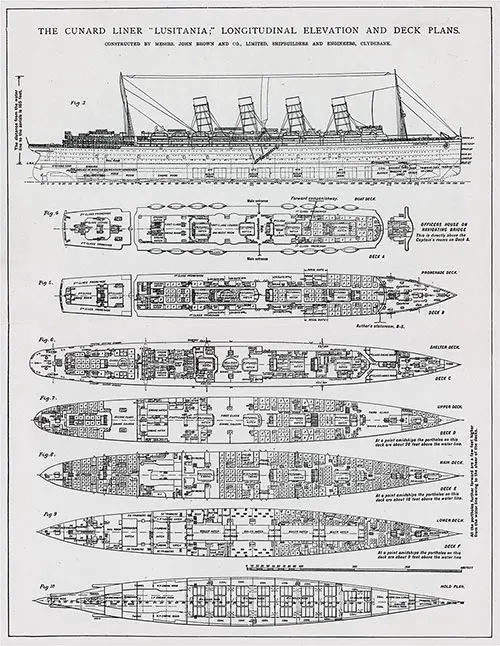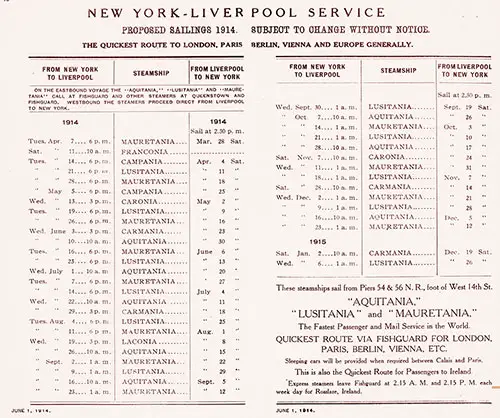RMS Lusitania Archival Collection
The RMS Lusitania, a renowned British ocean liner operated by the Cunard Line, played a significant role in early 20th-century transatlantic travel. The ship is most famously known for its tragic sinking on May 7, 1915, after being torpedoed by a German U-boat, an event that contributed to the United States entering World War I. The Lusitania archives offer detailed records, including passenger lists, sailing schedules, and personal stories, shedding light on the experiences of those who traveled aboard this ill-fated vessel.
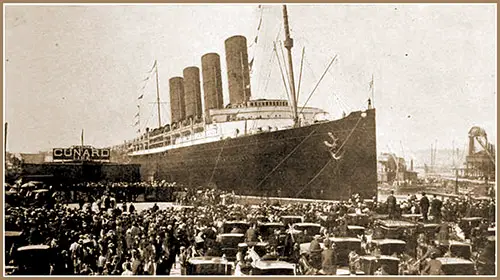
The Crowd About the Pier While the RMS Lusitania of the Cunard Line Was Warped Into Her Berth in New York, 13 September 1907. The Steamship Lusitania at Her Dock in New York After Her Record Run From Queenstown (Cobh) To Sandy Hook. She Crossed the Atlantic in Five Days, Fifty-four Minutes, Ending Her Maiden Voyage on 13 September 1907. This Was Six Hours and Twenty-six Minutes Better Than the Best Preceding Run Over the Same Course. Photo by Edwin Lesick. Harper's Weekly, 28 September 1907. | GGA Image ID # 1d4c444608
Content Links
- Lusitania (1907) Cunard Line
- Passenger Lists
- Brochures
- Publications
- Immigrant Documents
- Back Cover Images
- Menus
- Books
- Deck Plans
- Other Ephemera
- Sailing Schedules
- Passage Rates
- Excerpts from Information for Passengers
- Photographs
- Postcards
- Sinking of the RMS Lusitania & Aftermath
- Conclusion
- Key Points
- Summary
Lusitania (1907) Cunard Line
Built by John Brown & Go., Clydebank, Glasgow, Scotland. Tonnage: 31,550. Dimensions: 762' x 87' (790' o.l.). Quadruple-screw, 26 knots. Steam turbines. 68,000 I.H.P. Two masts and four funnels. Had eleven elevators. Passengers: 563 first, 464 second, 1,138 third. Maiden voyage: Liverpool-New York, September 7, 1907. Note: Recaptured the trans-Atlantic speed record for the British. She and her sister ship Mauretania retained the "Blue Ribbon" for a number of years. Fate: Torpedoed and sunk by German submarine near Old Head of Kinsale, May 7, 1915, with the loss of 1,198 lives, as she went down in 18 minutes after being hit, while on voyage from New York to England. Sister ship: Mauretania.
Return to Content Links
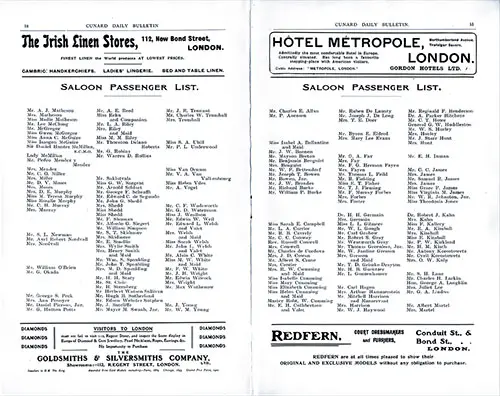
1908-06-06 RMS Lusitania Passenger List
Saloon Passenger List from the RMS Lusitania of the Cunard Line, Departing Saturday, 6 June 1908 from Liverpool to New York via Queenstown (Cobh), Commanded by Captain James B. Watt.
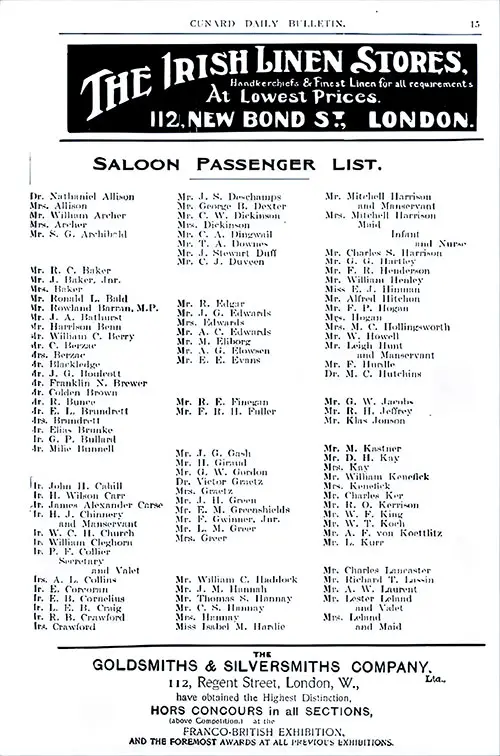
1909-03-20 RMS Lusitania Passenger List
Saloon Passenger List from the RMS Lusitania of the Cunard Line, Departing 20 March 1909 from Liverpool to New York via Queenstown (Cobh), Commanded by Captain W. T. Turner.
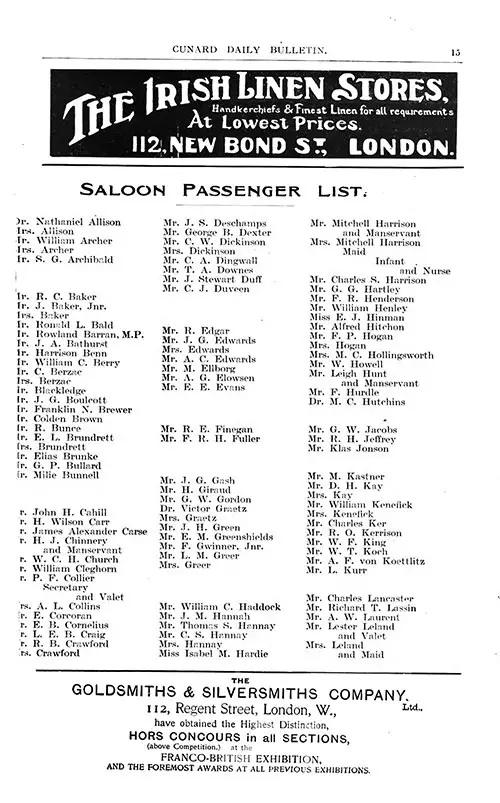
1909-03-31 SS Lusitania Passenger List
Saloon Passenger List from the SS Lusitania of the Cunard Line, Departing 31 March 1909 from New York to Liverpool via Queenstown (Cobh), Commanded by Captain W. T. Turner.
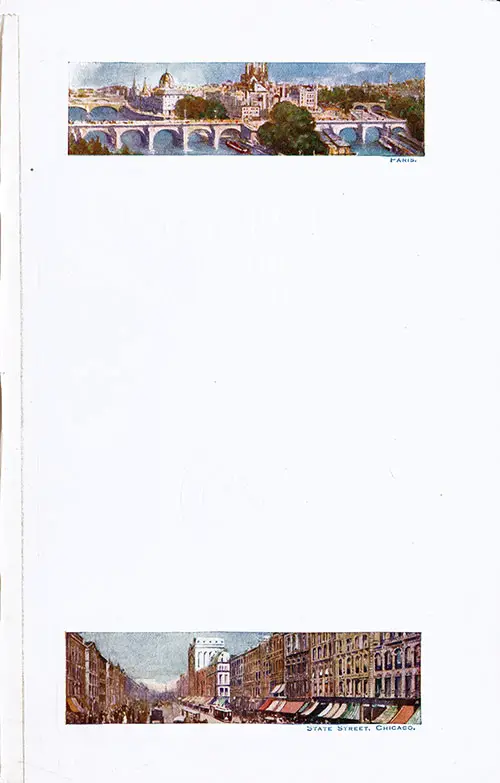
1912-08-17 RMS Lusitania Passenger List
Saloon Passenger List from the RMS Lusitania of the Cunard Line, Departing Saturday, 17 August 1912 from Liverpool to New York via Queenstown (Cobh), Commanded by Captain J. T. W. Charles. CB, RD, RNR.
Return to Content Links
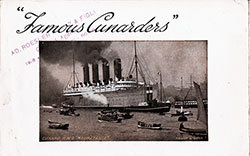
8-Page Booklet/Leaflet from 1910 titled "Famous Cunarders" provided an illustrated introduction to their "A"-List Cunard fleet including the Campania, Carmania & Caronia, Carpathia, Lusitania & Mauretania, Pannonia, and the Saxonia & Ivernia.

1913 - Cunard Passenger Log Book
Rare Third-Class Accommodation on Cunard Liners featuring interior and exterior photographs of the ships and accommodations for third class/steerage passengers. Undated brochure circa 1913. Its contents were meant to entice the immigrants to book passage to the New World. Ships Featured: Lusitania and Mauretania, Caronia and Carmania, Franconia and Laconia, Campania, Ivernia and Saxonia, and the Ascania.

1913 - Fishguard Information for Passengers of Cunard
Fishguard is situated on the south-west coast of Wales, and is the nearest British port to New York used by Atlantic liners. It affords the quickest means of reaching London, and is also a convenient port for the Continent. Ships Featured: Lusitania and Mauretania.
Return to Content Links

1908-06-10 Cunard Daily Bulletin - RMS Lusitania
Cunard Daily Bulletin, RMS Lusitania Edition, provided readers with plenty of advertisements, short stories, Saloon Passenger List for this voyage, Marconigrams, View of the Enquiry Bureau onboard the RMS Carmania and Caronia, and a Photograph of the RMS Lusitania.
Return to Content Links
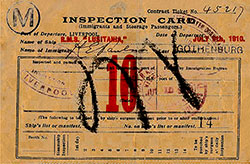
1910-07-09 Immigrant Inspection Card - Cunard RMS Lusitania
Immigrant Inspection Card issued by the Cunard Line RMS Lusitania dated 9 July 1910 for Swedish Immigrant K. E. Paulson from Gothenburg, Sweden. When landing at New York this card was pinned to the coat or dress of the passenger in a prominent position.
Return to Content Links
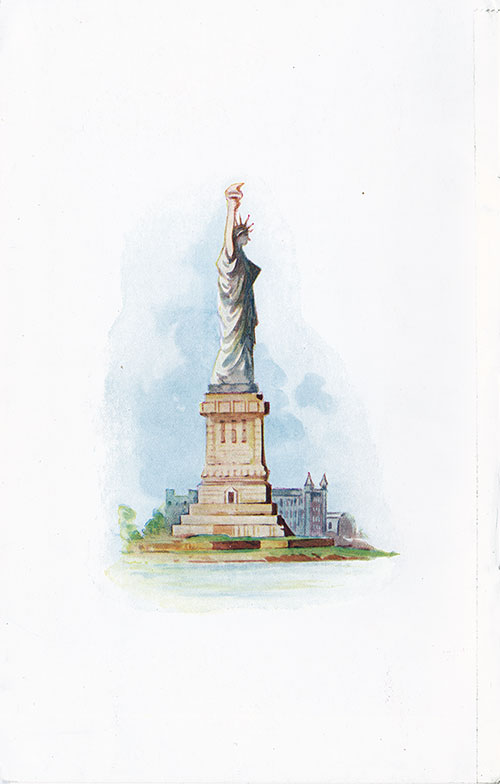
Back Cover, Cunard RMS Lusitania Passenger List - 17 August 1912. | GGA Image ID # 11c7f98ba3
Return to Content Links
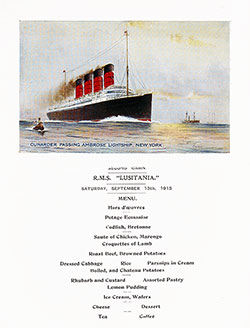
1913-09-13 RMS Lusitania Dinner Menu Card
Dinner Menu Card from Saturday, 13 September 1913, on board the RMS Lusitania of the Cunard Line featured Saute of Chicken, Marengo, Croquettes of Lamb, and Ice Cream, Wafers for Dessert.
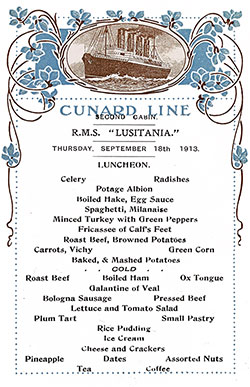
1913-09-18 RMS Lusitania Luncheon Menu Card
Luncheon Menu Card from Thursday, 18 September 1913, on board the RMS Lusitania of the Cunard Line featured Boiled Hake, Egg Sauce, Spaghetti, Milanaise, and Rice Pudding for Dessert.
Return to Content Links
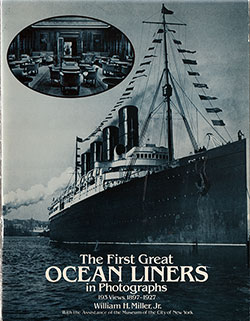
The First Great Ocean Liners in Photographs - 1983
Sumptuous volume recalls the glorious early years of elegant transatlantic travel. Over 190 historic photographs depict exterior and interior views of 101 great ocean liners, including the Virginian, Imperator, Vaterland, Bismarck, Lusitania, Mauretania, Balmoral Castle, Titanic, Olympic, Aquitania and dozens more. Full captions.
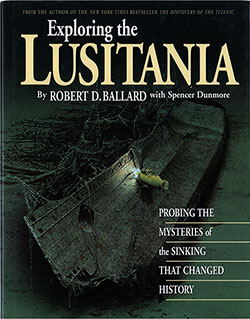
Exploring The Lusitania - Robert D. Ballard - 0446518514
In May of 1915, a German torpedo sank the sleek Cunard liner Lusitania with the loss of 1,195 civilian lives. The sinking turned world opinion against Germany, and the deaths of 123 American passengers were the first step in bringing the United States into World War I.
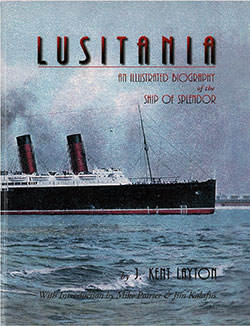
Lusitania - An Illustrated Biographhy Of The Ship Of Splendor - 2007
Prepare to take a journey back in time... step aboard the decks of one of the world's largest, fastest, and most beloved ocean liners, and experience the Lusitania in all her splendor.
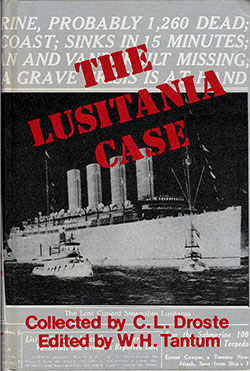
The cause of Germany, so far as it had an appeal to the sympathy, the intelligence, and the conscience of the United States, went down with the Lusitania.
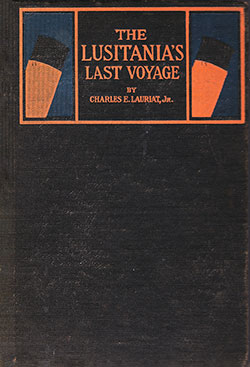
Mr. Lauriat gives a simple, direct, and dignified account of his personal experiences on the great Cunarder during the frightful hours just before and following the final disaster. It is an interesting account of thrilling personal experiences told with fairness.

RMS Lusitania. The very mention of her name summons a vision of disaster. Ask anyone what they know of the Lusitania and the vague reply will invariably be something like, ‘Wasn’t that the big liner the Germans sank?

Picture History of the Cunard Line 1840 - 1990
Magnificent pictorial tribute to the long line of illustrious ships that sailed for one of the world's great shipping companies. Extensive fact-filled text, captions and over 180 photographs and illustrations recall the Britannia, Lusitania, Mauretania, Queen Elizabeth, Queen Mary and the QE2, among many others. Introduction.

Distinguished Liners from The Shipbuilder - 1906-1914 Volume 1
An authentic replication to the smallest detail of the best of The Shipbuilder magazine, 1906-1914, including articles on the Titanic, Olympic, Lusitania, Mauretania, and more. This encyclopedic collection contains original text, photographs, and advertisements, as well as 22 fold-out blueprint plans, five color plates, a two-color Titanic cutaway folding advertisement and even two facsimile subscription forms.
Return to Content Links
The Cunard Liner Lusitania Longitudinal Elevation and Deck Plans. Constructed by Messrs. John Brown and Co., Limited, Shipbuilders and Engineers, Clydebank. The Plans of the Lusitania Here Reproduced Are from "Engineering" (London) In the Issue for May 14th, 1915. They Are the Plans Originally Published in That Magazine When the Boat Was First to Put into Commission in 1907. The Arrangement and Number of the Lifeboats Were Changed a Few Years Back and Were Different from Those Shown in the Plan. On Her Last Voyage, There Were Eleven on Each Side, Slung Higher to Allow Space for the Collapsible Lifeboats That Rested on the Deck Under the Regular Lifeboats. Also, This Plan Does Not Show the Extra Collapsible Lifeboats Nested Out on the After Deck. The Launch That Is Indicated on the Plan, I Did Not See. The Lusitania's Last Voyage, 1915. | GGA Image ID # 1812db3742. Click for Larger Image.
Return to Content Links
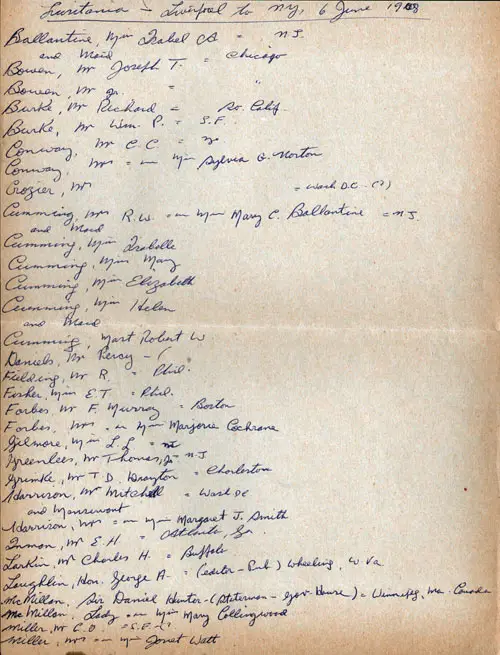
Passengers' Handwritten Comments About Other Passengers in First Class. Part 1 of 2. Cunard Daily Bulletin, Lusitania Edition, 10 June 1908. | GGA Image ID # 1e9feb06bd
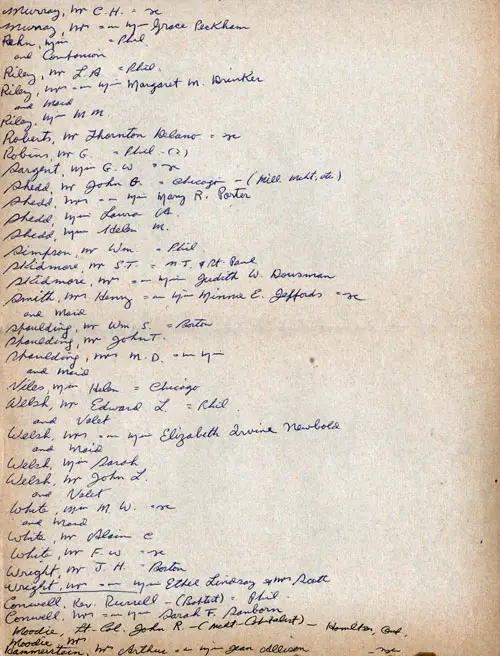
Passengers' Handwritten Comments About Other Passengers in First Class. Part 2 of 2. Cunard Daily Bulletin, Lusitania Edition, 10 June 1908. | GGA Image ID # 1ea0177aa1
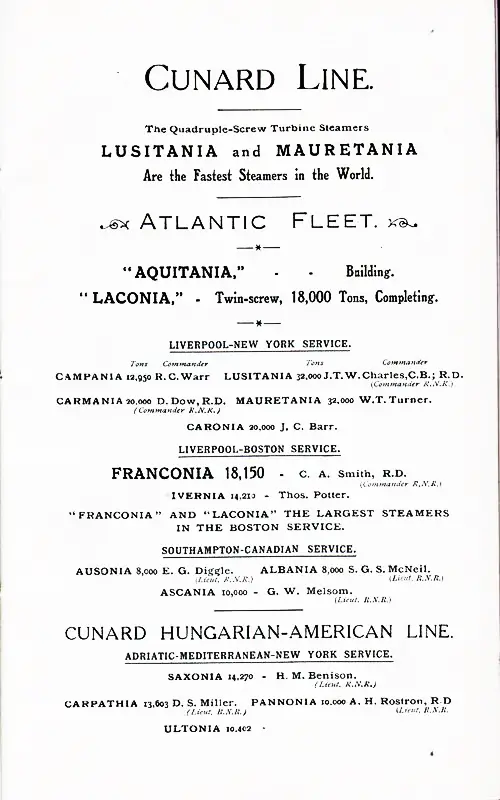
Cunard Line Atlantic Services and Fleet List with Tonnage and Assigned Commanders, 1911. Ships Included the Albania, Aquitania, Ascania, Ausonia, Campania, Carmania, Caronia, Carpathia, Franconia, Ivernia, Laconia, Lusitania, Mauretania, Pannonia, Saxonia, and Ultonia. RMS Franconia Passenger List, 8 August 1911. | GGA Image ID # 1e8030fb50
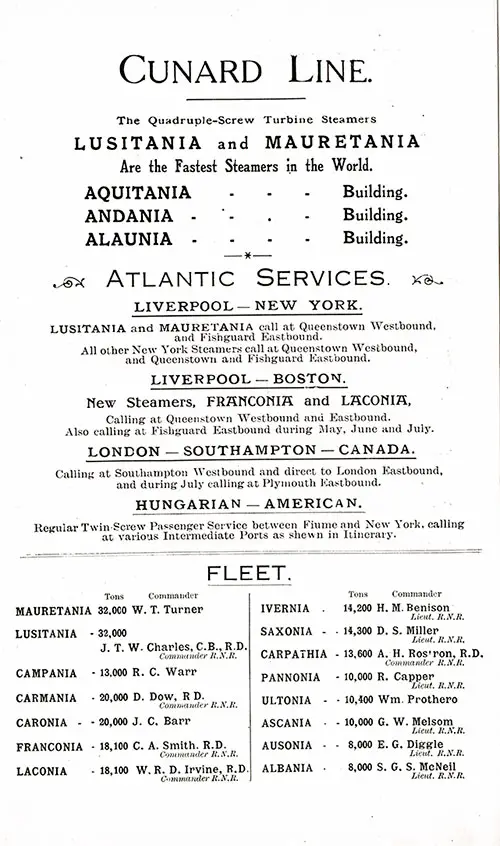
Cunard Line Atlantic Services and Fleet List with Tonnage and Assigned Commanders, 1912. Ships Include the Alaunia, Albania, Andania, Aquitania, Ascania, Ausonia, Campania, Carmania, Caronia, Carpathia, Franconia, Ivernia, Laconia, Lusitania, Mauretania, Pannonia, Saxonia, and Ultonia. RMS Caronia Passenger List, 30 March 1912. | GGA Image ID # 1dc9ece700
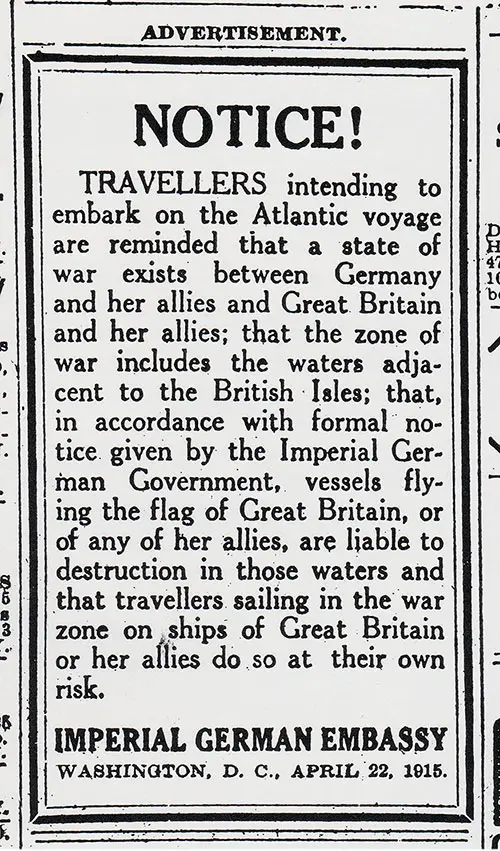
NOTICE — Travelers intending to embark on the Atlantic voyage are reminded that a state of war exists between Germany and her Allies and Great Britain and her Allies; that the zone of war includes the waters adjacent to the British Isles; that, in accordance with formal notice given by the Imperial German Government, vessels flying the flag of Great Britain or any of her Allies are liable to destruction in these waters and that travelers sailing in the war zone on ships of Great Britain or her Allies do so at their own risk. Signed: Imperial German Embassy Washington , D. C., April 22, 1915. | GGA Image ID # 1976d3069d
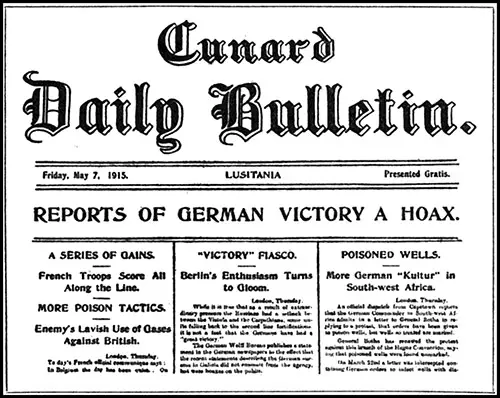
Lusitania's Last Cunard Daily Bulletin, Lusitania Edition, from Friday, 7 May 1915. | GGA Image ID # 1d4bee9105
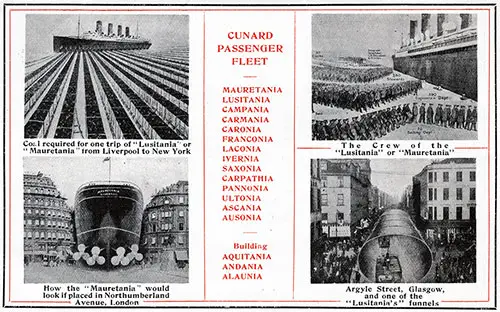
Cunard Passenger Fleet with Comparisons Showing Relative Size of Ships. | GGA Image ID # 118efdd844
Return to Content Links
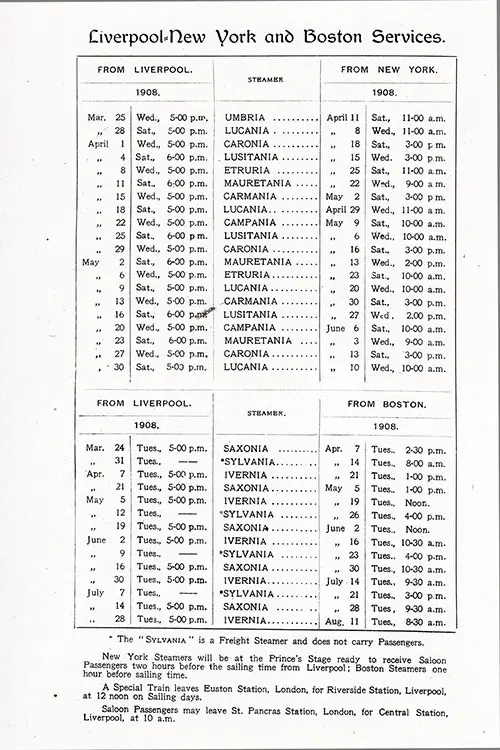
Sailing Schedule, Liverpool-New York and Boston Services, from 25 March 1908 to 11 August 1908. Ships Included the Campania, Carmania, Caronia, Etruria, Ivernia, Lucania, Lusitania, Mauretania, Saxonia, Sylvania, and Umbria. The Sylvania is a Freight Steamer and Does Not Carry Passengers. RMS Mauretania Passenger List, 11 April 1908. | GGA Image ID # 1e3195b748
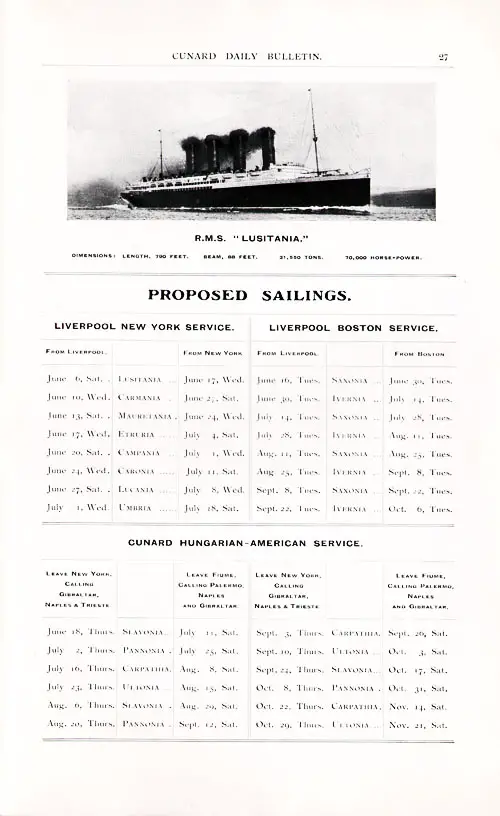
Sailing Schedule, Liverpool-New York, Liverpool-Boston, and Hungarian-American Service, from 6 June 1908 to 21 November 1908. Ships Included the Campania, Carmania, Caronia, Carpathia, Lucania, Lusitania, Mauretania, Pannonia, Slavonia, Ultonia, and Umbria. Cunard Daily Bulletin, Lusitania Edition, 10 June 1908. | GGA Image ID # 1e9f8fdaf1
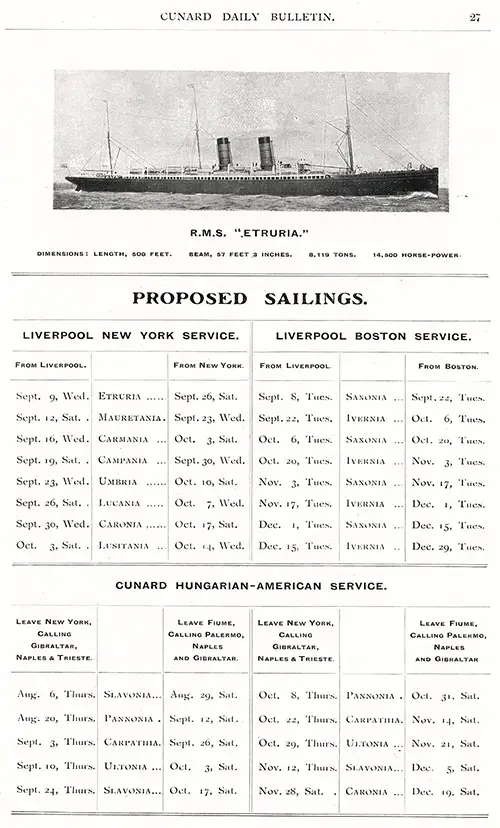
Sailing Schedule, Liverpool-New York, Liverpool-Boston, New York-Gibraltar-Naples-Trieste-Fiume, Fiume, Palermo-Naples-Gibraltar-New York, from 9 September 1908 to 29 December 1908. Ships Included the Campania, Carmania, Caronia, Carpathia, Etruria, Lucania, Lusitania, Mauretania, Pannonia, Slavonia, Ultonia, and Umbria. Cunard Daily Bulletin, 11 September 1908, Etruria Edition. | GGA Image ID # 1f031656fa
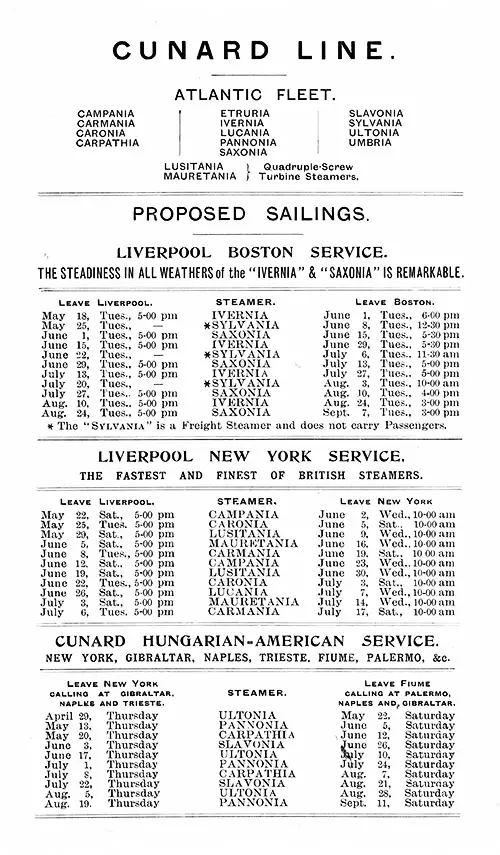
Proposed Sailings, Liverpool-Boston Service, Liverpool-New York Service, and Hungarian-American Service Covering 18 May 1909 to 11 September 1909. Ships Include the Campania, Carmania, Caronia, Carpathia, Ivernia, Lucania, Lusitania, Mauretania, Pannonia, Saxonia, Slavonia, and Ultonia. It also contains the Cunard Atlantic Fleet List. RMS Ivernia Passenger List, 18 May 1909. | GGA Image ID # 1dc96786d6
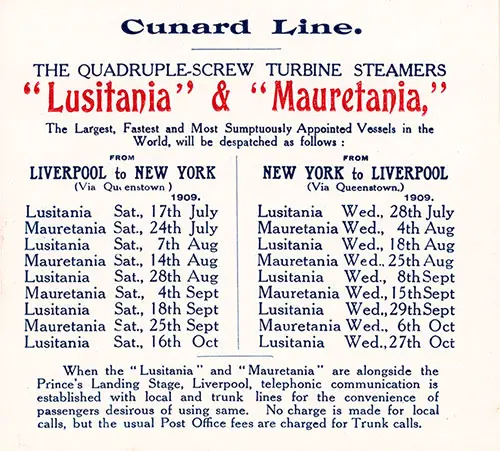
Sailing Schedule for the Quadruple-Screw Turbine Steamers "Lusitania" and "Mauretania," The Largest, Fastest, and Most Sumptuously Appointed Vessels in the World, July-October 1909. Insert in a Saloon Class Passenger List of the RMS Saxonia From 27 July 1909. | GGA Image ID # 159e71e3c2
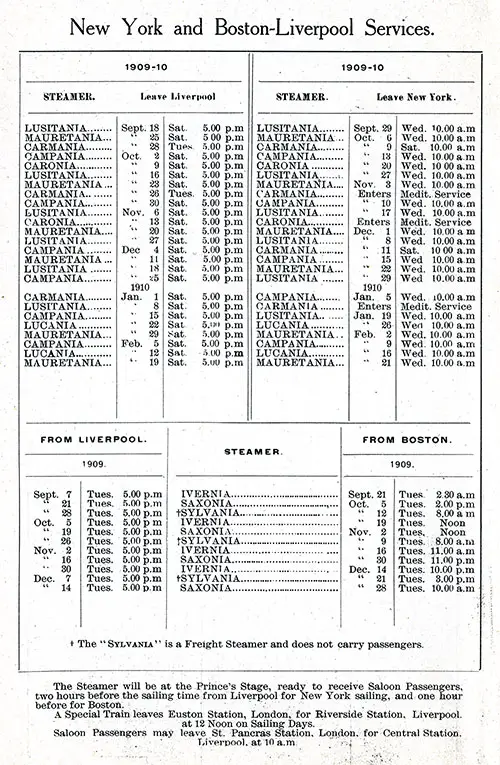
Sailing Schedule, New York and Boston-Liverpool, from 7 September 1909 to 21 February 1910. Ships Included the Campania, Carmania, Caronia, Ivernia, Lusitania, Mauretania, and Saxonia. NOTE: The Sylvania is a Freight Steamer and Does Not Carry Passengers. RMS Mauretania Saloon Passenger List, 6 October 1909. | GGA Image ID # 20fa83835c
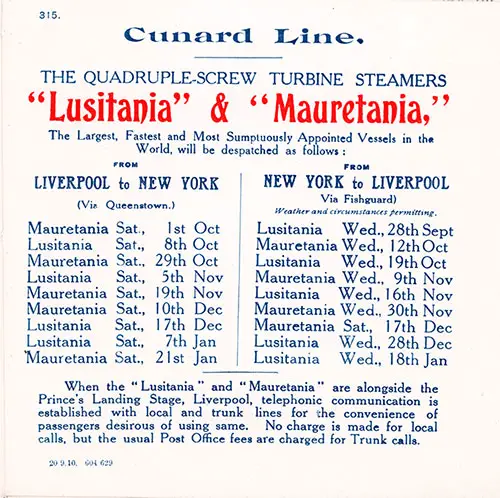
Sailing Schedule, Liverpool-New York, 28 September 1910 to 21 January 1911. Ships Included the Lusitania and Mauretania. RMS Campania Passenger List, 24 September 1910. | GGA Image ID # 1ea09e73eb
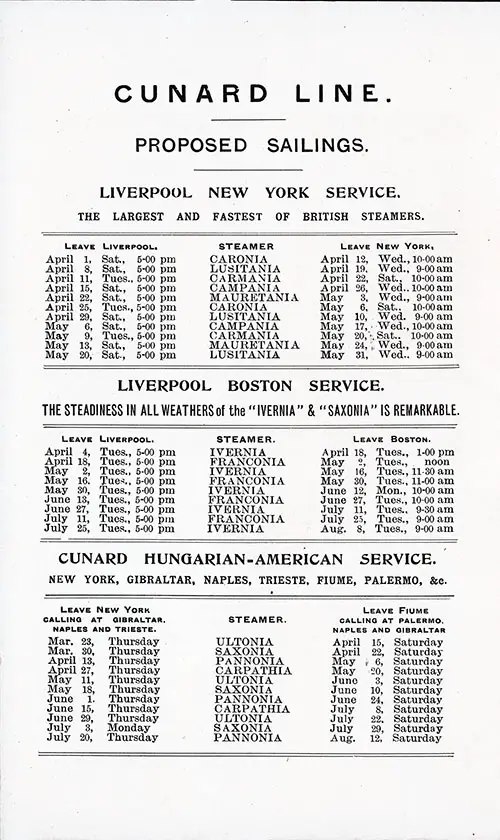
Proposed Sailings, Liverpool-New York Service, Liverpool-Boston Service, and Hugarian-American Service from 23 March 1911. Ships Include the Campania, Carmania, Caronia, Carpathia, Franconia, Ivernia, Lusitania, Mauretania, Pannonia, Saxonia, and Ultonia. RMS Caronia Passenger List, 1 April 1911. | GGA Image ID # 1dc9aa5170
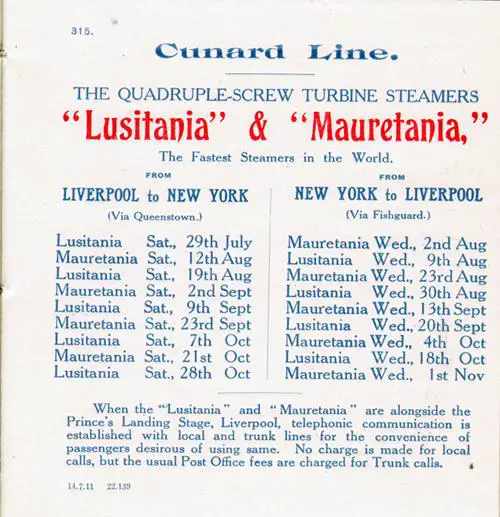
Sailing Schedule for the Quadruple-Screw Turbine Steamers RMS Lusitania and RMS Mauretania from 29 July 1911 to 1 November 1911. When the "Lusitania" and "Mauretania" Are Alongside the Prince's Landing Stage, Liverpool, Telephonic Communication Is Established with Local and Trunk Lines for the Convenience of Passengers Desirous of Using Same. No Charge Is Made for Local Calls, but the Usual Post Office Fees Are Charged for Trunk Calls. Published 14 July 1911. | GGA Image ID # 1db6f9d658
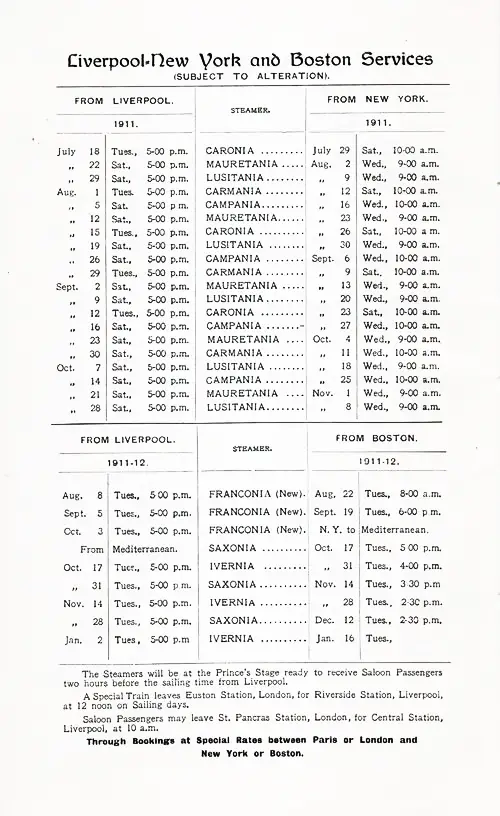
Cunard Liverpool-New York and Boston Services. Sailing Schedule from 18 July 1911 to 16 January 1912. Ships Include the Caronia, Mauretania, Lusitania, Carmania, Campania, Caronia, Franconia, Saxonia, and Ivernia. | GGA Image ID # 1db72eac98

Proposed Sailings, Liverpool-New York Service, Liverpool-Boston Service, and Hungarian-American Service from 2 March 1912 to 6 August 1912. Ships Include the Campania, Carmania, Caronia, Carpathia, Franconia, Ivernia, Laconia, Lusitania, Mauretania, Pannonia, and Saxonia. RMS Caronia Passenger List, 30 March 1912. | GGA Image ID # 1dc9e8927c
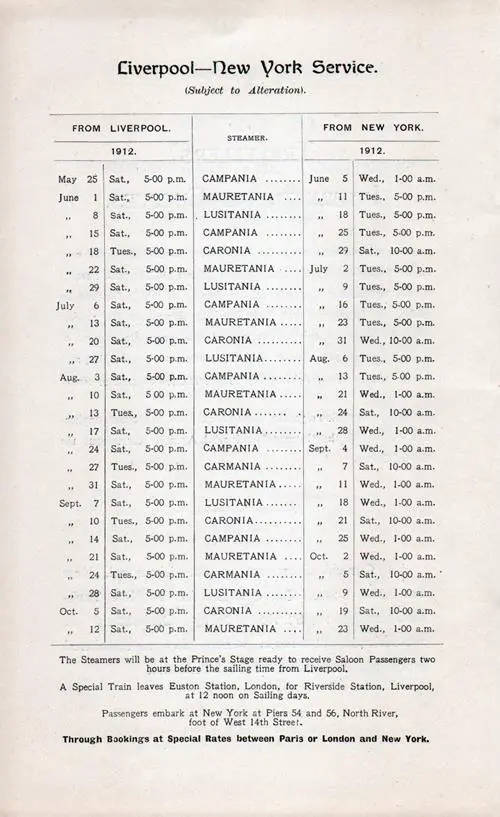
Cunard Liverpool-New York Service Sailing Schedule from 25 May 1912 to 23 October 1912. Ships Include the Campania, Caronia, Mauretania, and Lusitania. | GGA Image ID # 1dbbde659c

Proposed Sailings Liverpool-New York Service, Liverpool-Boston Service, and Hungarian-American Service from 9 November 1912 to 11 March 1913. Ships Include Campania, Carmania, Caronia, Carpathia, Franconia, Ivernia, Laconia, Lusitania, Mauretania, Pannonia, Saxonia, and Ultonia. SS Carmania Passenger List, 23 November 1912. | GGA Image ID # 1dc95f6c98
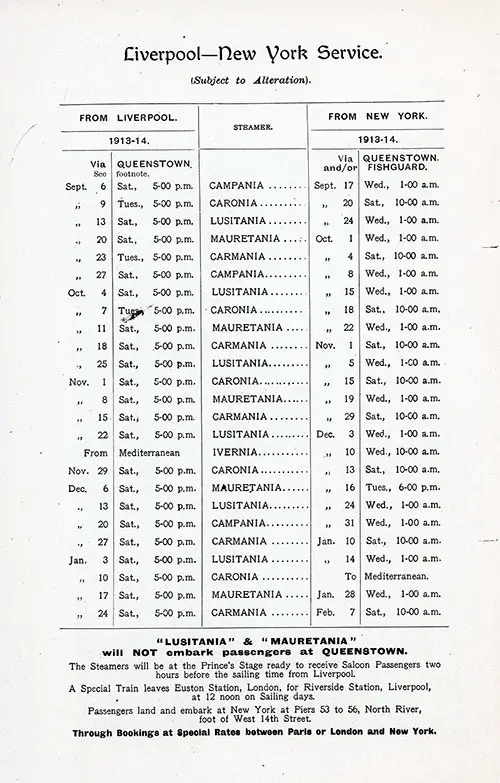
Cunard Liverpool-New York Service from 6 September 1913 to 7 February 1914. Ships Included the Campania, Carmania, Caronia, Ivernia, Lusitania, and Mauretania. RMS Carmania Passenger List, 23 September 1913. | GGA Image ID # 1dcaadfa74
Return to Content Links
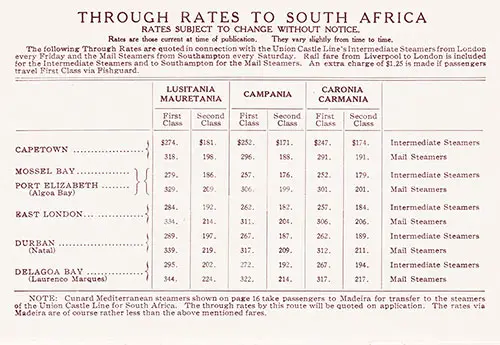
Through Rates to South Africa, First and Second Class. Ships Included the Lusitania, Mauretania, Campania, Caronia, and Carmania. Cunard Line Services 1914 Brochure. | GGA Image ID # 1f790261ed
Rates Subject to Change Without Notice. Rates Are Those Current at Time of Publication. They Vary Slightly from Time to Time. The Following: Through Rates Are Quoted in Connection with the Union Castle Line's Intermediate Steamers from London Every Friday and the Mail Steamers from Southampton Every Saturday. Rail Fare from Liverpool to London Is Included for the Intermediate Steamers and to Southampton for the Mail Steamers. An Extra Charge of $1.25 Is Made if Passengers Travel First Class via Fishguard.
NOTE: Cunard Mediterranean steamers shown on page 16 take passengers to Madeira for transfer to the steamers of the Union Castle Line for South Africa. The through rates by this route will be quoted on application. The rates via Madeira are of course rather less than the above mentioned fares.
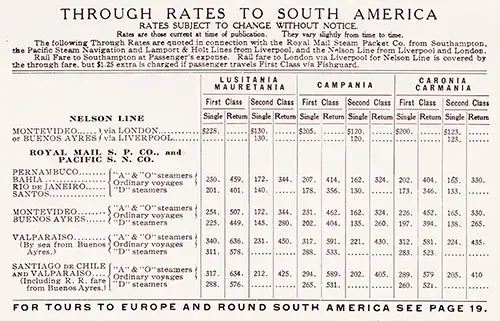
Through Rates to South America, First and Second Class, One Way (Single) or Round Trip (Return). Ships Included the Lusitania, Mauretania, Campania, Caronia, and Carmania. Cunard Line Services 1914 Brochure. | GGA Image ID # 1f7935065b
RATES SUBJECT TO CHANGE WITHOUT NOTICE. Rates are those current at the time of publication. They vary slightly from time to time. The following Through Rates are quoted in connection with the Royal Mail Steam Packet Co. from Southampton, the Pacific Steam Navigation and Lamport & Holt Lines from Liverpool, and the Nelson Line from Liverpool and London—rail Fare to Southampton at Passenger's expense. The through fare covers rail fare to London via Liverpool for Nelson Line. However, $1.25 extra is charged if the passenger travels First Class via Fishguard.
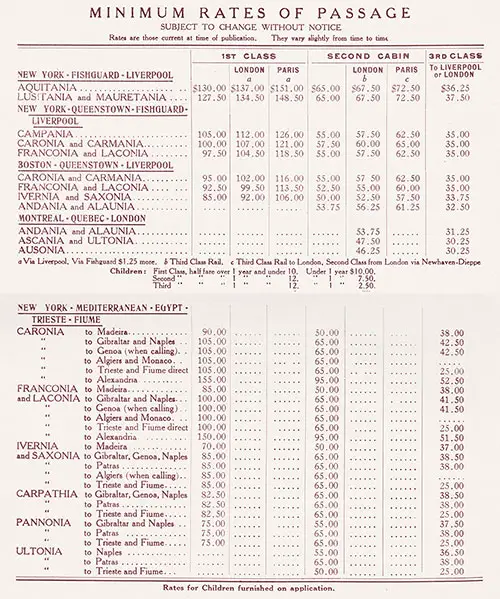
Minimum Rates of Passage, First Class, Second Cabin, or Third Class. Ships Included the Aquitania, Lusitania, Maruetania, Campania, Caronia, Carmania, Franconia, Laconia, Ivernia, Saxonia, Andania, Alaunia, Ascania, Ultonia, Ausonia, Carpathia, and Pannonia. Cunard Line Services 1914 Brochure. | GGA Image ID # 1f7949ddf9
Sailing Schedule, New York - Liverpool Service, from 7 April 1914 to 6 January 1915. Ships Included the Aquitania, Campania, Carmania, Caronia, Franconia, Laconia, Lusitania, and Mauretania. Cunard Line Services 1914 Broncure. | GGA Image ID # 1f79a02dae. Click for Larger Image.
Return to Content Links
Information for Passengers - 20 March 1909
Passengers are respectfully notified that a Stenographer and Typist is carried on the ship, and is prepared to execute every description of work at moderate prices.
Passengers are urged not to leave any Articles of Value about the Saloon, Staterooms, or elsewhere, especially before the departure of the steamer. Money, Jewelery, or other Valuables should be deposited with the Purser for safe keeping.
Camp Stools can be obtained from the Bedroom Steward.
The Cunard Steam Ship Company Limited Money Drafts
The Company issue, free of charge, drafts on their own Offices in New York, Boston, or Chicago payable at sight in U.S. Currency, and to avoid delay and the responsibility of carrying loose money, passengers are recommended to avail themselves of these drafts.
Source: RMS Lusitania Passenger List - 20 March 1909
Information for Passengers - 30 March 1912
With the view of enabling passengers to reach London on Monday afternoon and Paris the same evening or following morning, the "Lusitania" and "Mauretania" have been scheduled to leave the New York Pier at 1 am on Wednesdays and proceed direct to Fishguard without calling at Queenstown. The steamers will thus be due at Fishguard on Monday morning.
Source: RMS Caronia Passenger List - 30 March 1912
Information for Passengers - 17 August 1912
Chairs and Rugs may be Hired at a Cost of 4/- (or $1) each on application to the Deck Steward. Each Rug will be contained in a sealed cardboard box and will bear a serial number which will be worked into the material so that passengers will have no difficulty in identifying their rugs. At the end of each voyage, the rugs which have been in use, will be sent to the store and thoroughly cleaned, before being re-issued.
Stenographer and Typist Is on Board for the Convenience of Passengers and Is Prepared to Attend Promptly to All Work Required.
Meals will be served in the Saloon at the following times:
- Breakfast at 8.30 to 10:00 am.
- Luncheon at 1:00 pm
- Dinner 7:00 pm.
- Supper if required must be ordered before 10 o’clock
The Bar will be closed at 11.30 p.m.
Seats at Table
Application may be made at any of the Chief Offices in advance, or to the Second Cabin Steward on board the steamer on day of sailing.
Divine Service on Sunday at 10:30 am
Baggage
Passengers are recommended to insure their Baggage, as the Company's liability is strictly limited in accordance with Contract Ticket. All enquiries regarding Baggage on board ship should be addressed to the Baggage Master.
Valuables
The Company is not responsible for theft if valuables or money are kept in the Staterooms. The same should be placed in charge of the Purser for deposit in his safe, and a receipt will be given on the Company’s form. As no charge is made for carriage the Company cannot accept any responsibility for loss or damage, however arising, but passengers can protect themselves by insurance.
Passengers should obtain a receipt on the Company's form for any additional Passage Money or Freight paid on board.
Exchange of Money
The Purser is authorized to exchange money at the following rates. He will give American money for English at $4.80 to the pound sterling and English money for U.S. Currency at £1 sterling for $4.95.
The Surgeon is authorized to make customary charges, subject to the approval of the Commander, for treating any passengers at their request for any illness not originating on board the ship. In the case of sickness contracted on board no charge will be made and medicine will be provided free.
Dogs
Passengers are notified that dogs cannot be landed in Great Britain unless a license has previously been procured from the Board of Agriculture, London. Forms of license must be obtained by direct application to the Department before the dog Is taken on board.
Automobiles
The Purser can give full information to passengers who wish to hire Automobiles for Touring purposes, and on receipt of instructions will send Marconigram to Head Office ordering same.
Arrivals at New York
Passengers are landed at the Company’s Piers 54 to 56, North River, Foot of West 14th Street, where railway tickets can be purchased, and baggage checked to any part of the United States and Canada. After landing, passengers should enquire at the desk on the wharf for letters and telegrams.
When any of the Company’s steamers arrive at the Pier after 8:00 pm passengers have the option of remaining on board overnight and landing after Breakfast the following morning.
Public Telephones
Telephone service with booths and operator in attendance will be found near the Customs Lines on the New York wharf.
Arrivals at Liverpool
Time of Landing Passengers — When any of the Company’s steamers arrive alongside the Liverpool Landing Stage after 8 p m. it is optional for the passengers to go on shore that night. In the event, however, of their remaining on board, they will be landed after breakfast the following morning, either at the stage or in dock as circumstances may make desirable.
When the vessel reaches the river but does not come alongside the Stage, to prevent inconvenience and to most emergencies, any passengers desirous of disembarking will, on arrival of the steamer, be landed, with hand baggage only, by tender, provided that the Purser is advised before leaving Queenstown or Fishguard of the passenger’s wish to do so. Notice will be placed in the Companionway on arrival at Queenstown or Fishguard advising passengers of anticipated arrival at Liverpool, and arrangements for landing.
Source: RMS Lusitania Passenger List - 17 August 1912
Return to Content Links
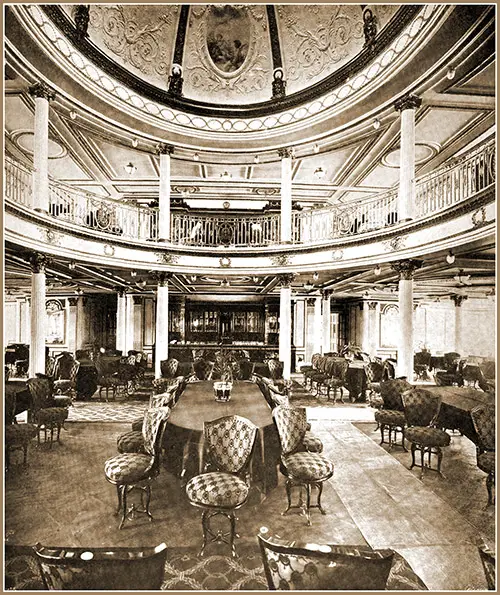
Lusitania First Class Dining Saloons Showing Dome. Engineering Magazine, 12 July 1907. | GGA Image ID # 1d4ea76a00
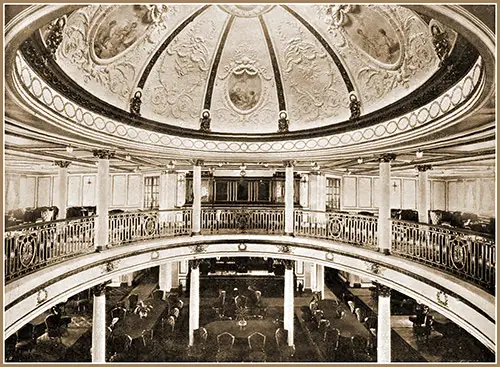
RMS Lusitania First Class Dining Saloon with View of Shelter Deck. Engineering Magazine, 12 July 1907. | GGA Image ID # 1d4ee38ccf
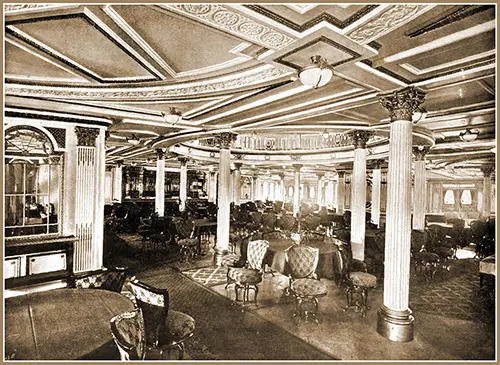
Corner of First Class Dining Saloon on the Upper Deck of the RMS Lusitania. Engineering Magazine, 12 July 1907. | GGA Image ID # 1d4f64130f
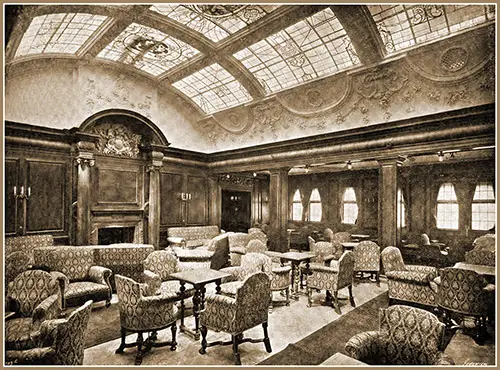
RMS Lusitania First Class Smoking Room. Engineering Magazine, 12 July 1907. | GGA Image ID # 1d4f7e4534
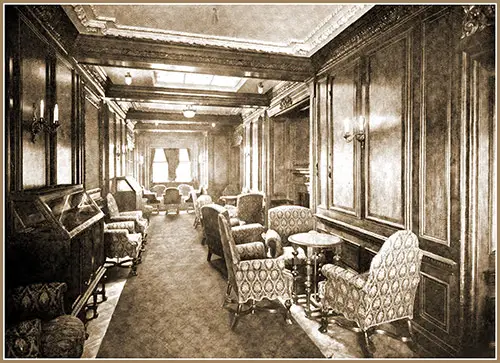
Forward Portion of First Class Smoking Room on the RMS Lusitania. Engineering Magazine, 12 July 1907. | GGA Image ID # 1d4ff81426
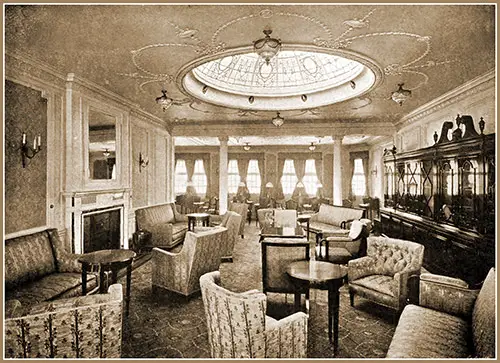
RMS Lusitania First Class Writing Room and Library. Engineering Magazine, 12 July 1907. | GGA Image ID # 1d50a249c6
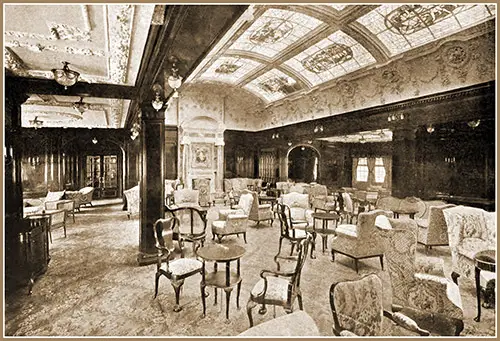
RMS Lusitania First Class Lounge. Engineering Magazine, 12 July 1907. | GGA Image ID # 1d50dc4a70
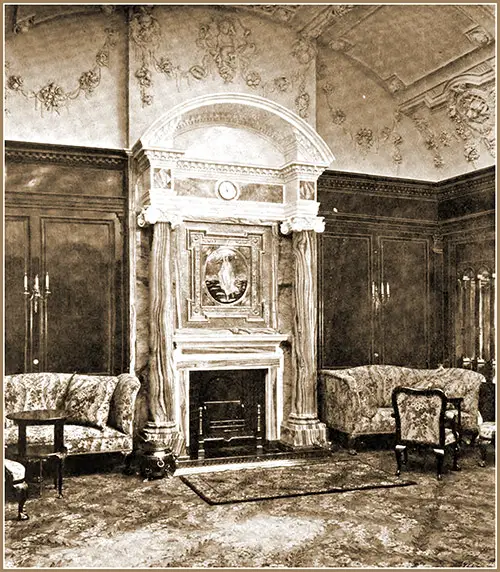
Fireplace in First Class Lounge on the RMS Lusitania. Engineering Magazine, 12 July 1907. | GGA Image ID # 1d50de6dd7
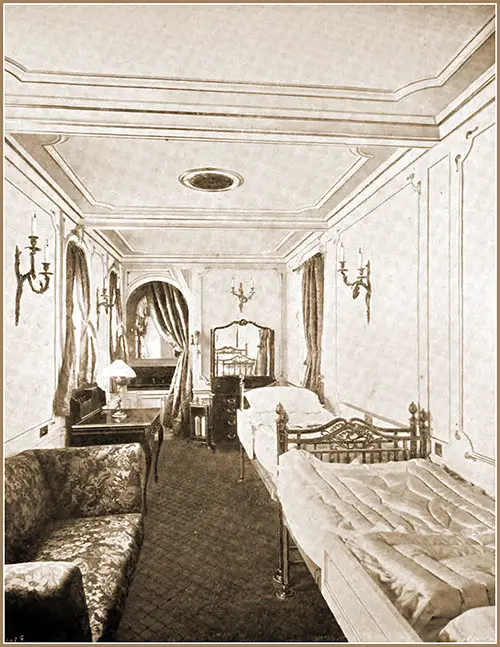
One of the En Suite Bedrooms on the RMS Lusitania. Engineering Magazine, 12 July 1907. | GGA Image ID # 1d50f60c4d
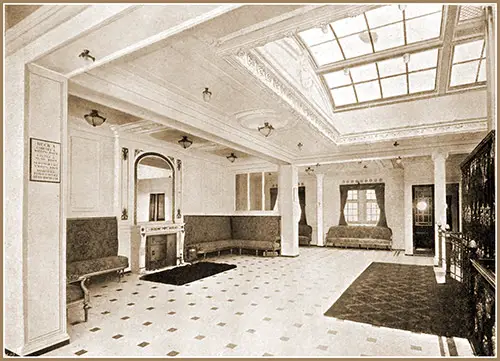
RMS Lusitania Shelter Deck Entrance Hall With Hoists. Engineering Magazine, 12 July 1907. | GGA Image ID # 1d510b6083
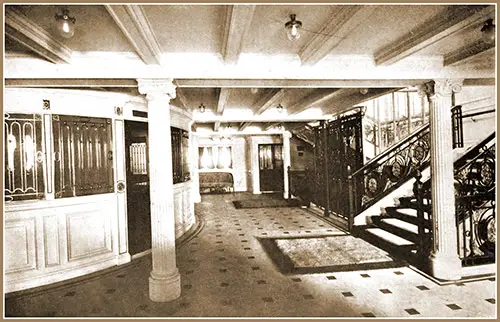
Promenade Deck Entrance Hall and Information Bureau on the RMS Lusitania. Engineering Magazine, 12 July 1907. | GGA Image ID # 1d510f9f38
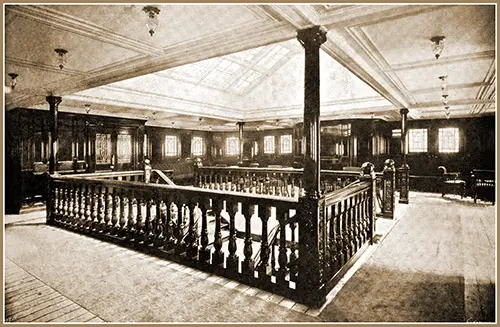
Second Class Lounge on the RMS Lusitania. Engineering Magazine, 12 July 1907. | GGA Image ID # 1d515fa680
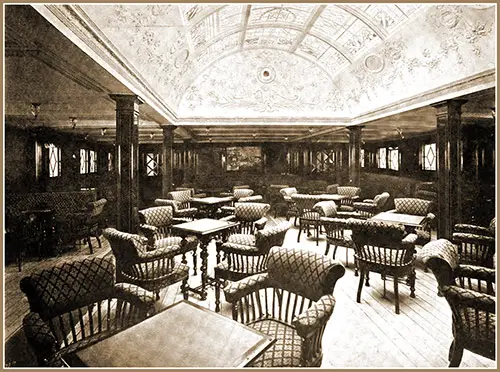
RMS Lusitania Second Class Smoking Room. Engineering Magazine, 12 July 1907. | GGA Image ID # 1d5179f4b0
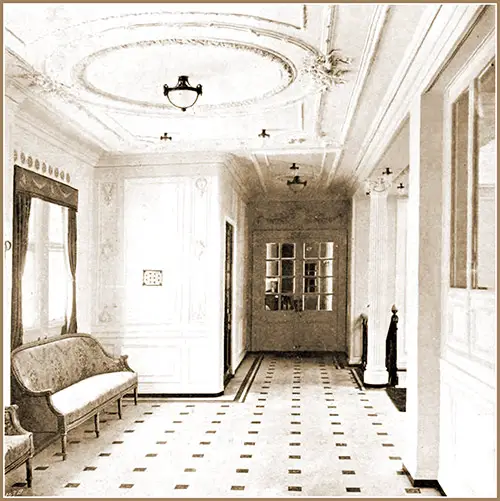
RMS Lusitania Alleyway. Engineering Magazine, 12 July 1907. | GGA Image ID # 1d5190dd98
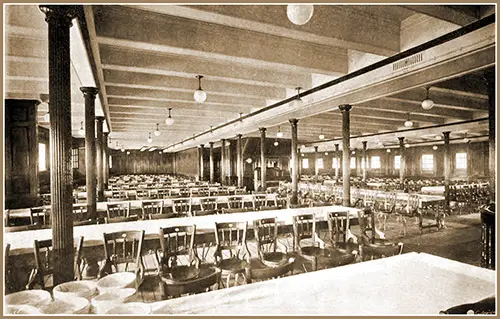
Third Class Dining Saloon on the RMS Lusitania. Engineering Magazine, 12 July 1907. | GGA Image ID # 1d51c720ff
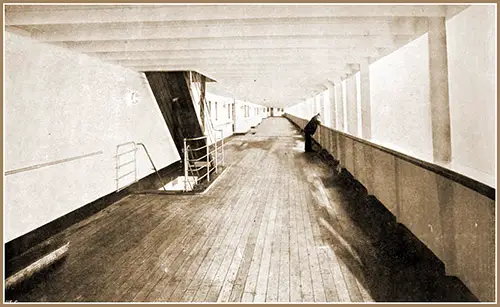
View of Lusitania's Promenade Deck. Engineering Magazine, 12 July 1907. | GGA Image ID # 1d5214c088
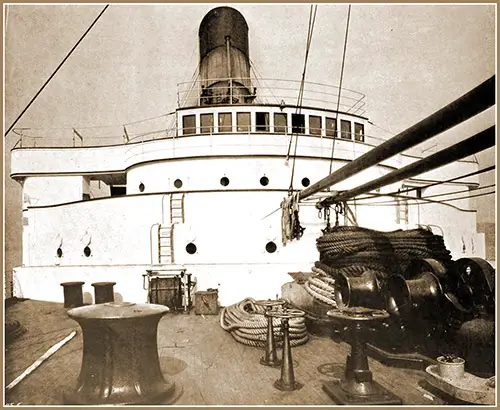
View of Lusitania's Bridge from the Forecastle. Engineering Magazine, 12 July 1907. | GGA Image ID # 1d523d4b77
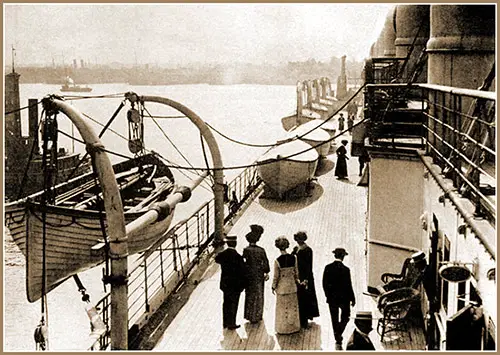
First Class Passengers Walking on the Boat Deck of the RMS Lusitania, ca 1915. | GGA Image ID # 1d5253b3ad
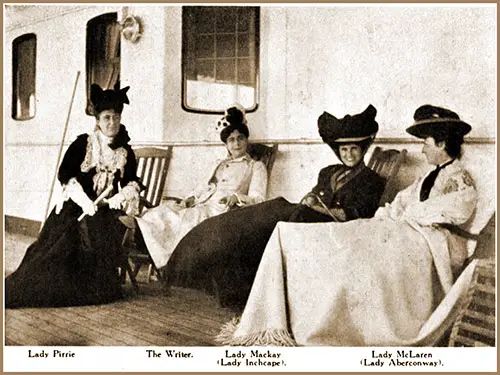
Lady Pirrie, "The Writer," Lady Mackay, and Lady McLaren, on the RMS Lusitania During the Trial Trip Around Ireland, July 1907. | GGA Image ID # 1d52576888
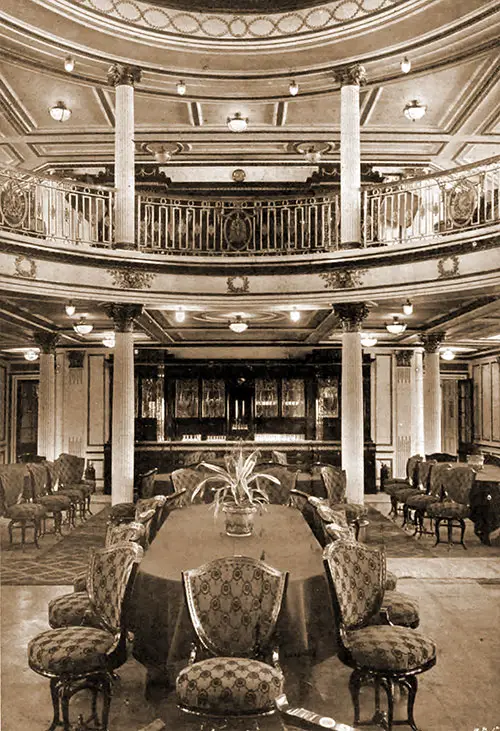
First Class Dining Saloon on the RMS Lusitania. The Syren and Shipping, 31 July 1907. | GGA Image ID # 1ea1d92c2d
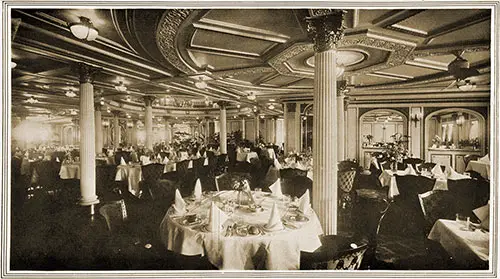
Lower Dining Saloon of the RMS Lusitania. New York Times, 16 May 1915. | GGA Image ID # 1ea2d54b63
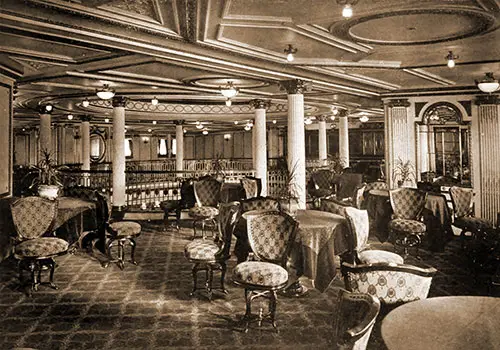
Restaurant on the Lusitania. The Syren and Shipping, 31 July 1907. | GGA Image ID # 1ea1fd17d0
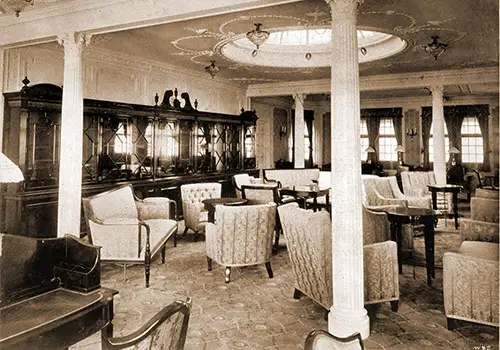
First Class Library on the RMS Lusitania. The Syren and Shipping, 31 July 1907. | GGA Image ID # 1ea20c00b0
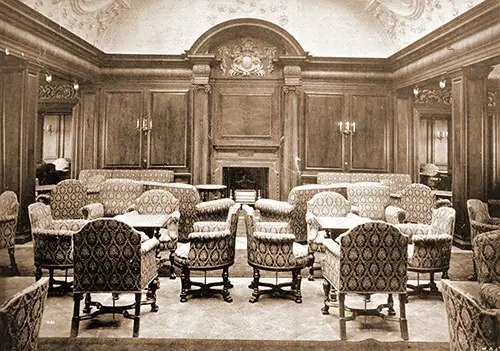
View of the First Class Smoking Room on the RMS Lusitania. The Syren and Shipping, 31 July 1907. | GGA Image ID # 1ea20fa2be
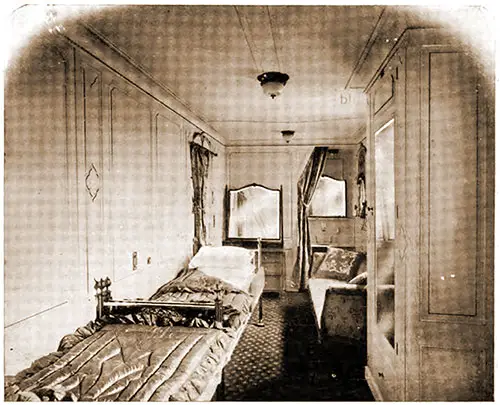
Waring and Gallow Designed Stateroom on the RMS Lusitania. The Syren and Shipping, 4 September 1907. | GGA Image ID # 1ea230ce70
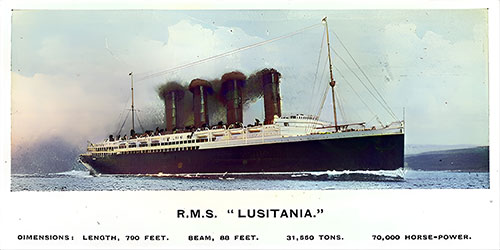
RMS Lusitania, Published in the Lusitania Edition of the Cunard Daily Bulletin for 10 June 1908. | GGA Image ID # 1321bb4559
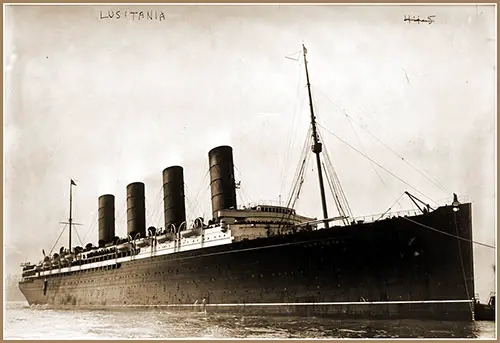
RMS Lusitania Coming Into Port ca 1910, Possibly in New York. George Grantham Bain Collection. Library of Congress # 2006677521. | GGA Image ID # 1d4c6d5aac

The RMS Lusitania of the Cunard Line at the End of Voyage, 22 November 1907. Library of Congress # 2007661235. | GGA Image ID # 1d4e71b041
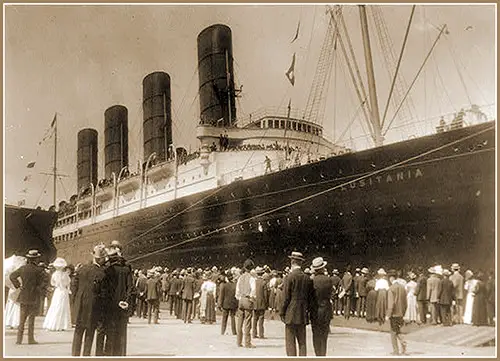
Lusitania Arriving in N.Y. For the First Time, Sept. 13, 1907. Starboard View; Crowd at Dock; People Waving From Ship. Photo by Frances Benjamin Johnston. Library of Congress # 2002721369. | GGA Image ID # 1d4e89119e
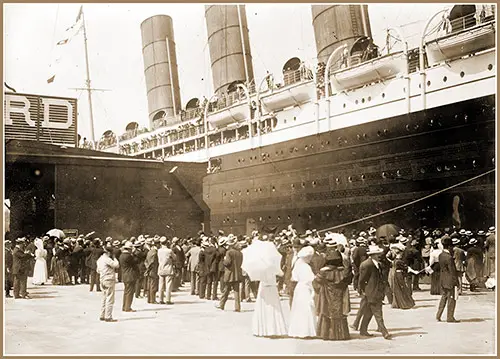
Lusitania - Arriving in New York City; Close-up of Starboard Side at Dock Showing Crowd Gathered on Pier. Bain News Service, 1907. Library of Congress # 2014680081. | GGA Image ID # 1d4ea6a488
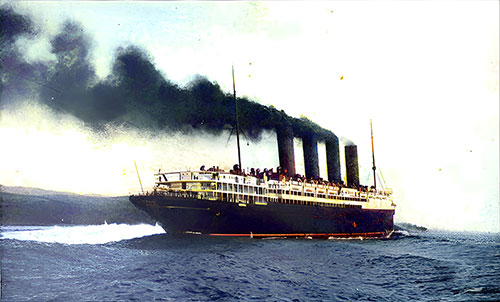
The 44,000 Ton Cunard Ocean Liner RMS Lusitania. The Unsinkable Titanic (1912) p,. 37. | GGA Image ID # 1074d5816d
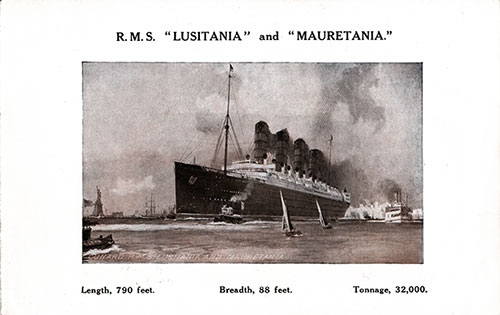
RMS Lusitania and RMS Mauretania. Length: 790 Feet. Breadth: 88 Feet. Tonnage: 32,000. | GGA Image ID # 118b20b51c
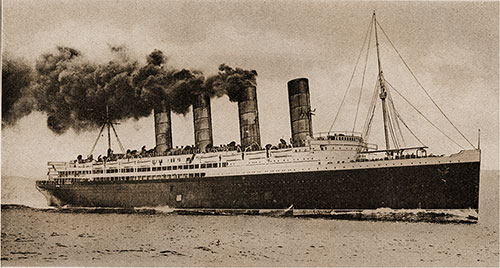
A German Submarine U-20 Fired Two Torpedoes Into the Side of the 32,000 Ton RMS Lusitania of the Cunard Line off Old Head of Kinsale on the Southern Irish Coast, Sinking the Ocean Liner on 7 May 1915. The Lusitania's Last Voyage, 1915. | GGA Image ID # 1813500026
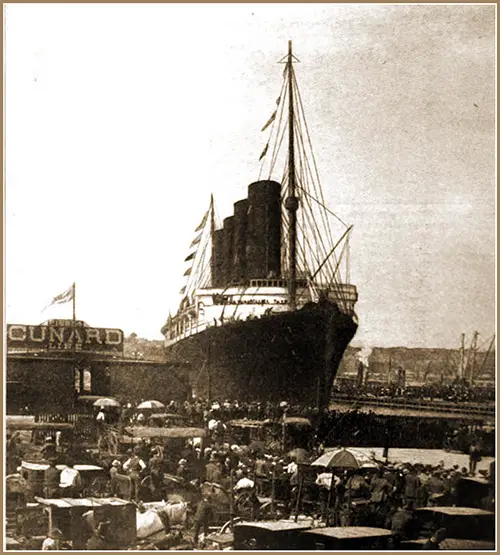
The RMS Lusitania Docked at New York After Maiden Voyage, 13 September 1907. The American Review of Reviews, October 1907. | GGA Image ID # 1ea024583c
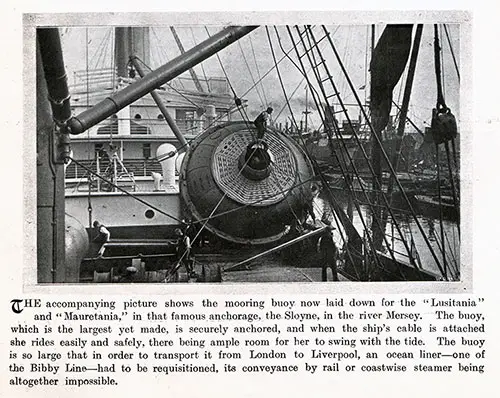
Mooring Buoy Now Laid Down for the "Lusitania" and "Mauretania" in That Famous Anchorage, the Sloyne, in the River Mersey. The Buoy, Which Is the Largest Yet Made, Is Securely Anchored. When the Ship's Cable Is Attached, She Rides Easily and Safely, There Being Ample Room for Her to Swing with the Tide. The Buoy Is So Large That to Transport It from London to Liverpool, an Ocean Liner—One of the Bibby Line—Had to Be Requisitioned, Its Conveyance by Rail or Coastwise Steamer Being Altogether Impossible. Cunard Daily Bulletin, Campania Edition, 24 January 1908. | GGA Image ID # 1ea0c86f9c
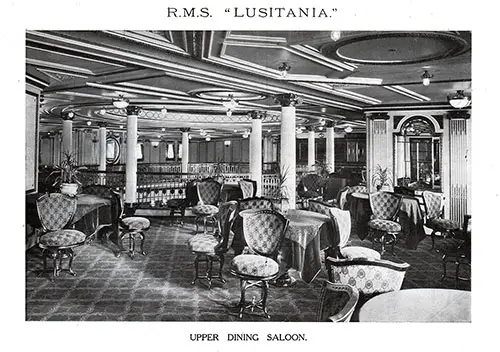
Upper Dining Saloon on the RMS Lusitania. Cunard Daily Bulletin, Campania Edition, 24 January 1908. | GGA Image ID # 1ea0e6a9ea
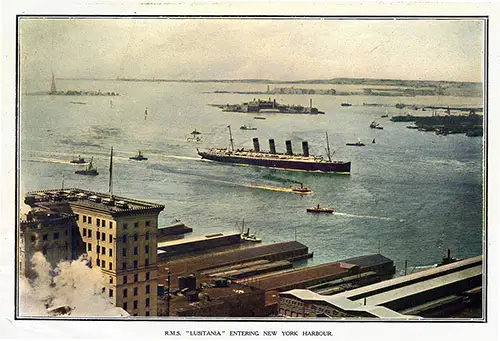
RMS Lusitania Entering New York Harbor. Cunard Daily Bulletin, Summer Number, 1912. | GGA Image ID # 1ea129a579
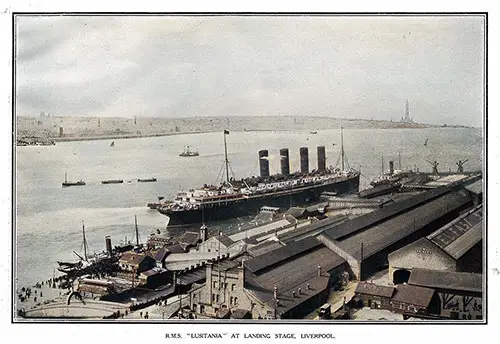
RMS Lusitania at Landing Stage, Liverpool. Cunard Daily Bulletin, Summer Number, 1912. | GGA Image ID # 1ea14381a8
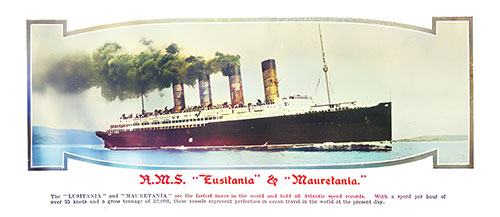
The RMS Lusitania and RMS Mauretania Are the Fastest Liners in the World and Hold All Atlantic Speed Records. With a Speed per Hour of over 25 Knots and a Gross Tonnage of 32,000, These Vessels Represent Perfection in Ocean Travel in the World at the Present Day. Cunard Daily Bulletin, Summer Number, 1912. | GGA Image ID # 1ea14de29f
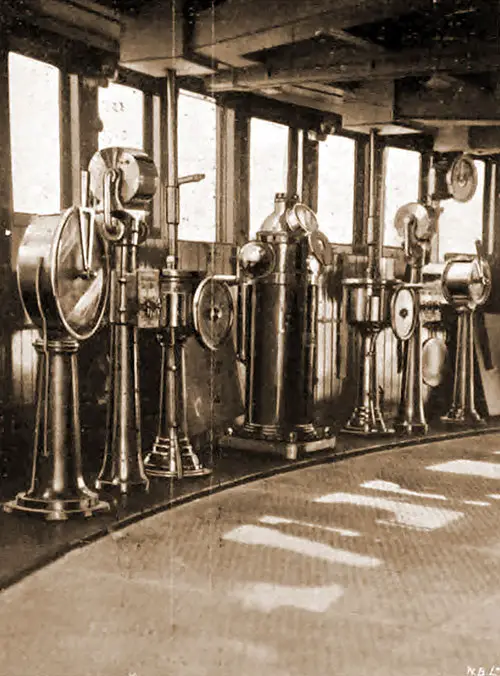
Bridge House of the RMS Lusitania. The Syren and Shipping, 18 September 1907. | GGA Image ID # 1ea2609110
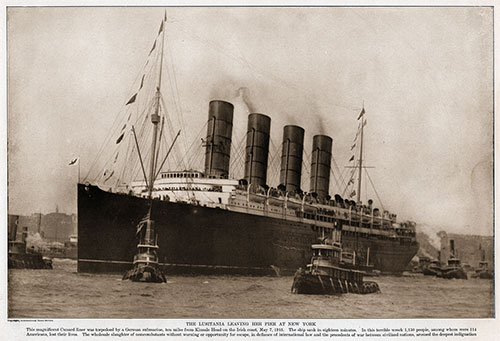
The Lusitania Leaving Her Pier at New York. This Magnificent Cunard Liner Was Torpedoed by a German Submarine Ten Miles from Kinsale Head on the Irish Coast on 7 May 1915. The Ship Sank in Eighteen Minutes. In This Terrible Wreck, 1,150 People, 114 Americans, Died. The Wholesale Slaughter of Noncombatants Without Warning or Opportunity for Escape, in Defiance of International Law and the Precedents of War Between Civilized Nations, Aroused the Most Profound Indignation. Collier's Photographic History of the European War, 1916. | GGA Image ID # 1ea28649cf
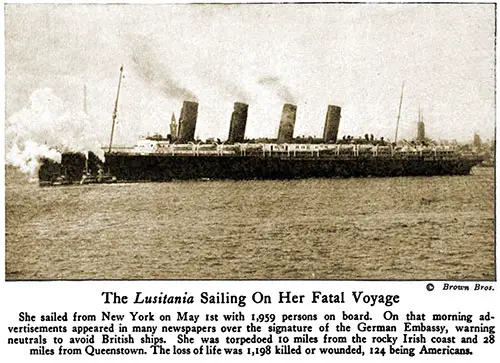
The RMS Lusitania Sailed from New York on 1 May 1915 with 1,959 Persons on Board. On That Morning Advertisements Appeared in Many Newspapers over the Signature of the German Embassy, Warning Neutrals to Avoid British Ships. She Was Torpedoed 10 Miles from the Rocky Irish Coast and 28 Miles from Queenstown. The Loss of Life Was 1,198 Killed or Wounded, 124 Being Americans. Photo by Brown Brothers. Harper's Pictorial, Volume 4, 1920. | GGA Image ID # 1ea28a8338
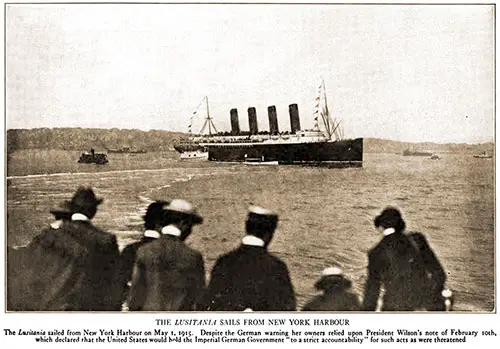
The Lusitania Sails from New York Harbor. The Lusitania Sailed from New York Harbor on May I, 1915. Despite the German Warning, Her Owners Relied upon President Wilson's Note of February 10th, Which Declared That the United States Would Hold the Imperial German Government "To a Strict Accountability" for Such Acts as Were Threatened. History of the Great War, Volume 4, 1919. | GGA Image ID # 1ea2abeacb
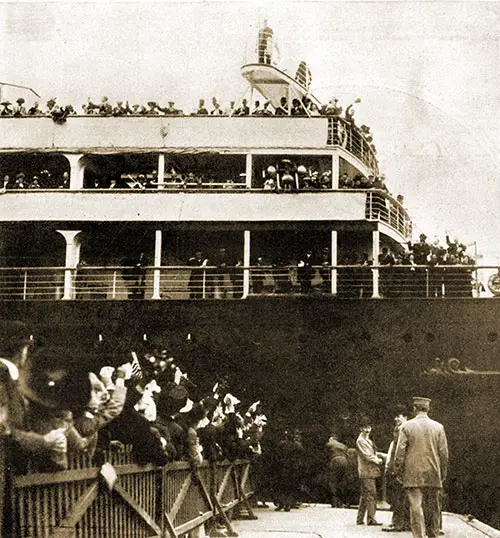
Section Showing Crowd on New York Pier Waiving Last Farewell to the Lusitania. New York Times, 16 May 1915. | GGA Image ID # 1ea3960ff5
Return to Content Links
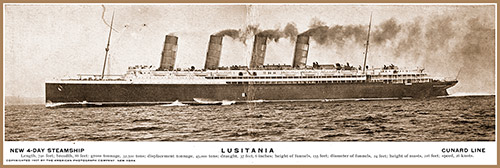
1907 Postcard Offers Panoramic View of the RMS Lusitania. New 4-Day Steamship of the Cunard Line. Length: 700 Feet; Breadth: 88 Feet; Gross Tonnage: 32,500 Tons; Displacement Tonage: 45,000 Tons; Draught: 37 Feet 6 Inches; Height of Funnels: 155 Feet; Diameter of Funnels: 24 Feet; Height of Masts: 216 Feet; Speet: 26 Knots. American Photograph Company, New York. Library of Congress # 2013646024. | GGA Image ID # 1d4ce9cbbd
Return to Content Links
Sinking of the RMS Lusitania & Aftermath
Our collection about the SS Lusitania of the Cunard Line includes articles and books about the sinking of the great and luxurious ocean liner by the German U-Boat and the aftermath that caused the US to enter World War I.
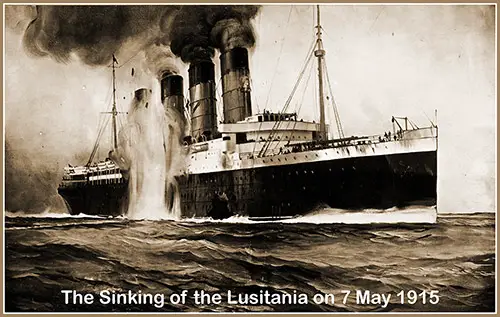
The Sinking of the Lusitania on 7 May 1915. A Photograph of a Drawing Made for the New York Herald and the London Sphere Shows the R.M.S. Lusitania as a Second Torpedo Hits Behind a Gaping Hole in the Hull. Library of Congress # 2006677520. | GGA Image ID # 1d4c5c87fc
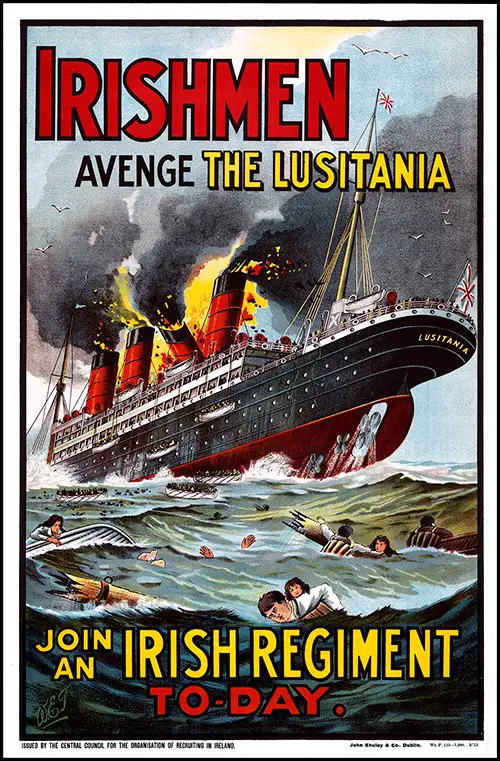
Irishmen - Avenge the Lusitania. Join an Irish Regiment Today / W.E.T. ; John Shuley & Co., Dublin. Poster Showing the Lusitania in Flames and Sinking, With People in the Water and Lifeboats in the Foreground. Central Council for the Organisation of Recruiting in Ireland, 1915. Library of Congress # 2003668198. | GGA Image ID # 1d4cfbe08b
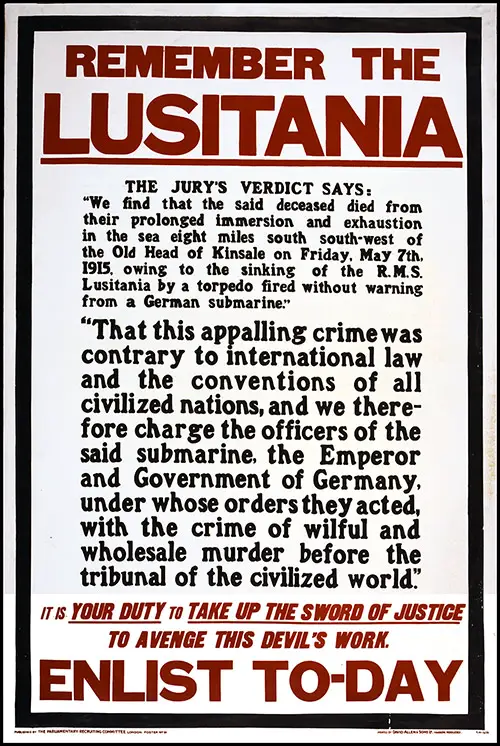
Remember the Lusitania ... Enlist Today Poster / Printed by David Allen & Sons Ld., Harrow, Middlesex. Parliamentary Recruiting Committee, 1915. Library of Congress # 2003668491. | GGA Image ID # 1d4e178184
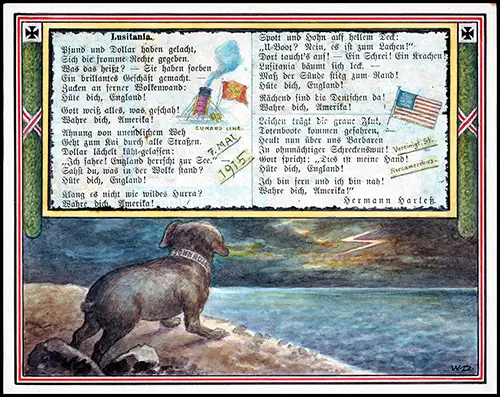
Poem About the Sinking of the Lusitania, 1915. Drawing Shows Dog Labeled John Bull Staring Across Water at Turbulent Sky With Attached Newspaper Clipping of Poem by Hermann Harless About the Sinking of the Lusitania. F.M.J. Rehse Archiv und Museum f. Zeitgeschichte, München. Library of Congress # 2020630273. | GGA Image ID # 1d4dc4c899
Return to Content Links
Conclusion
The sinking of the RMS Lusitania was a pivotal moment in maritime history, symbolizing the dangers of naval warfare and the perils of sea travel during wartime. The disaster resulted in significant loss of life and had a profound impact on international relations and public opinion, particularly in the United States. The Lusitania's legacy is preserved through extensive archival collections that document the lives of its passengers and crew, offering a window into the human stories behind the tragedy.
Return to Content Links
Key Points
-
🌊 Historic Significance: The Lusitania's sinking was a critical event that influenced global politics and wartime strategies, particularly the involvement of the United States in World War I.
-
📜 Passenger Lists: Detailed records of passengers, including notable individuals and families, provide a glimpse into the diverse backgrounds of those aboard.
-
🚢 Ship Specifications: As one of the fastest and most luxurious liners of its time, the Lusitania was a marvel of early 20th-century engineering and design.
-
🗺️ Sailing Routes: The liner regularly sailed between Liverpool, Queenstown (Cobh), and New York, facilitating both passenger and cargo transport.
-
🧳 Immigrant Journeys: The ship played a significant role in the movement of immigrants, many of whom were seeking new opportunities in the United States.
-
💔 Tragic Event: The sinking resulted in the loss of over 1,100 lives, including many civilians, and became a rallying point for Allied propaganda against Germany.
-
🧩 Archival Collections: The archives include personal artifacts, inspection cards, and other memorabilia, providing a rich historical resource.
-
📰 Public Reaction: The tragedy shocked the world, leading to widespread condemnation and a shift in public sentiment towards the war.
-
🎖️ Heroic Accounts: Stories of bravery and survival, such as those of the crew and passengers who tried to save others, are documented in the archives.
-
🛳️ Cultural Impact: The Lusitania remains a symbol of the perils of war and the vulnerability of civilians, influencing literature, art, and public memory.
Return to Content Links
Summary
-
Cultural and Historical Impact: The Lusitania's sinking was a landmark event in maritime and wartime history, influencing international politics and public opinion.
-
Passenger and Crew Records: Comprehensive lists provide detailed information about those aboard, including their fates and personal stories.
-
Luxury and Design: The Lusitania was an epitome of luxury and speed, offering state-of-the-art amenities to its passengers.
-
Regular Transatlantic Service: The liner's regular routes connected key European ports with New York, serving as a crucial link for travelers and immigrants.
-
Immigrant Stories: The ship was a significant vessel for immigrants, many of whom embarked on journeys to new lives in the Americas.
-
Tragedy and Heroism: The accounts of the sinking highlight both the horror of the event and the acts of heroism by passengers and crew.
-
Archival Documentation: The collection of documents and artifacts offers a comprehensive look at the Lusitania's history and its passengers' experiences.
-
Public and Political Response: The international reaction to the sinking had lasting effects on wartime policies and alliances.
-
Memorialization: The Lusitania is remembered as a symbol of the tragic consequences of war, with numerous memorials and commemorations.
-
Educational Resource: The Lusitania archives serve as a valuable educational resource, preserving the memory of those who sailed on her final voyage.
Return to Content Links

